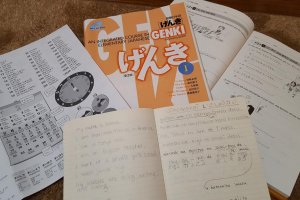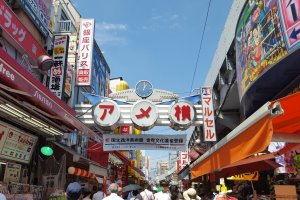I came to Japan knowing basically zero Japanese. I knew how to say kon’nichiwa (hello) and arigatō (thank you), and that was about it. I had learned to read a couple kana characters, in a last-ditch effort in the weeks before I departed, but other than that I was completely illiterate in Japanese. Dealing with the language barrier has been difficult, alienating, and frustrating. At times, it has brought me to the point of tears. But, in all honesty, it hasn’t been as much of a problem as I thought it might be.
I have been able to survive in Japan without knowing Japanese. I’ve been able to set up my new life, rent and furnish an apartment, buy groceries, navigate the train system, and go out to eat. Dealing with the language barrier has been a challenge, but it hasn’t been impossible.
A large part of this is due to the fact that I’m in Tokyo. Most people here know at least a couple words of English, and if they don’t, there’s usually someone nearby who does. All the signs and announcements at train stations are in both Japanese and English, and a lot of restaurants have English menus available. I know it would be much more difficult to survive in the inaka (countryside) than it is in Tokyo. But, it’s not just being in Tokyo, it’s also the kindness of the Japanese people, the power of non-verbal communication, and my willingness to laugh at myself and roll with the punches.
Never underestimate the power of pointing, hand gestures, and a smile. With a good attitude, a sense of humor, and a bit of patience, the language barrier is not as much of an obstacle as it might seem.
I’ve also been making every effort I can to learn Japanese. I am determined to not just deal with the language barrier, but to actually break it. Learning as much Japanese as possible was a goal I set for myself when starting the JET program. So, as soon as I arrived in Japan, I started studying. I bought myself a textbook, started learning to read, and signed up for a Japanese language class. I’ve always loved foreign languages, and I was excited to dive into Japanese. And… it did not go so well (at first).
It was months of just being realIy confused, and comprehending nothing. Learning Japanese felt like banging my head against the wall. Obviously, Japanese is extremely different from English, with a completely different writing system, sentence and grammar structures, and sounds. I didn’t even know where to start. The sounds and the symbols didn’t make any sense to me, and I struggled to repeat or retain even the most basic of phrases. It was slow going, and it was frustrating.
But, I did notice myself slowly progressing. I became more familiar with the strange-looking characters, and started to get a hold on the way sentences are formed. And, last week at my Japanese language classes, I had something of a breakthrough! Every week, we do a self-introduction circle. In previous weeks, I’ve just said my name, and haven’t really understood anything the others say. This time, I was able to give a full, six-sentence self-introduction in Japanese from memory, and understand the intros’ of my fellow students. This might sound like a small feat, but it felt HUGE to me. It was the first instance that I felt like I had something of a grasp on Japanese, and like I could actually understand and communicate information.
Since then, I’ve been noticing myself improve more and more, and it feels amazing. Finally, after months, Japanese is starting not to feel like a wild, untamable beast. It’s starting to feel a little bit familiar, and somewhat manageable. I’ve got the basic greeting/ordering/buying things phrases down. I can read hiragana and katakana (slowly), and write my name in Japanese. I can actually understand prices and numbers, and pick out certain words from conversations. On the train the other day, a Japanese person asked me where I’m from, and I was able to actually understand their question and answer it.
And I’m not trying to get too carried away – my ability level is still very low. I probably speak Japanese worse than a two year old right now. But, I can speak. I can say words in Japanese, and people understand them. It’s a great feeling, especially after months of being unable to communicate even the most basic sentiments. It’s progress. The language barrier, which felt for so long like an impenetrable fortress, is starting to come down. And I’m pretty happy about it.
So, what have I used to learn Japanese?
There are of course, a million different methods out there to learn a language. Here’s what has worked best for me.
Tofugu’s online Hiragana and Katakana guides
These guides are super helpful. They use mnemonics, and don’t require any writing, which allows you to learn very quickly.
Genki Japanese textbooks
The Genki books are one of the most popular English textbooks for learning Japanese, and are highly recommended. I bought the level I textbook and workbook, which both include CDs, and I have enjoyed them.
Weekly in-person Japanese language class, through Musashino International Association (MIA)
I have not been very good about self-study (see above), so it is this class that has really made the all difference. The format of the class is very laid-back and friendly. We sit in groups of two or three students with a teacher, and it is mostly conversational. When I first started, I was SO far below the level of everyone in the class that it was definitely intimidating. What I really needed was Japanese 101. But in retrospect, I think it was good to be thrown in over my head, because it forced me to start speaking, and I have learned so much. For anyone in west Tokyo, I would highly recommend the MIA language course. The teachers are all very kind, they tailor it to what you’re hoping to learn, and it’s super cheap!
Private Tutor
A huge perk to the MIA Language Course is that they connect you with a volunteer Japanese tutor, for free! So in addition to the course, I’ve been meeting with my tutor weekly. We usually meet in a coffee shop and have conversation practice and I ask her any questions about what I’m studying. She’s also been an absolute lifesaver and helped me with issues in daily life, such as paying my bills, registering my bike, and translating the buttons on my washer and heater, so I can actually use them properly. She is an angel, and I am so thankful for her!
Immersion
I am also of course, enrolled in the best kind of language education there is: complete immersion. I am living in Japan, and hearing, reading, and speaking Japanese on a daily basis. I have what every language student needs: unlimited opportunities to practice my Japanese with native speakers in everyday situations. If you're looking to truly improve or master your Japanese, this is the way to do it. With all of these different ways combined, I have started to make some progress in learning Japanese, and it feels great. I was able to survive without Japanese, but it’s definitely easier now that I have a little. And for anyone interested in traveling to or living in Japan I would encourage you not to let the language barrier stop you!

























